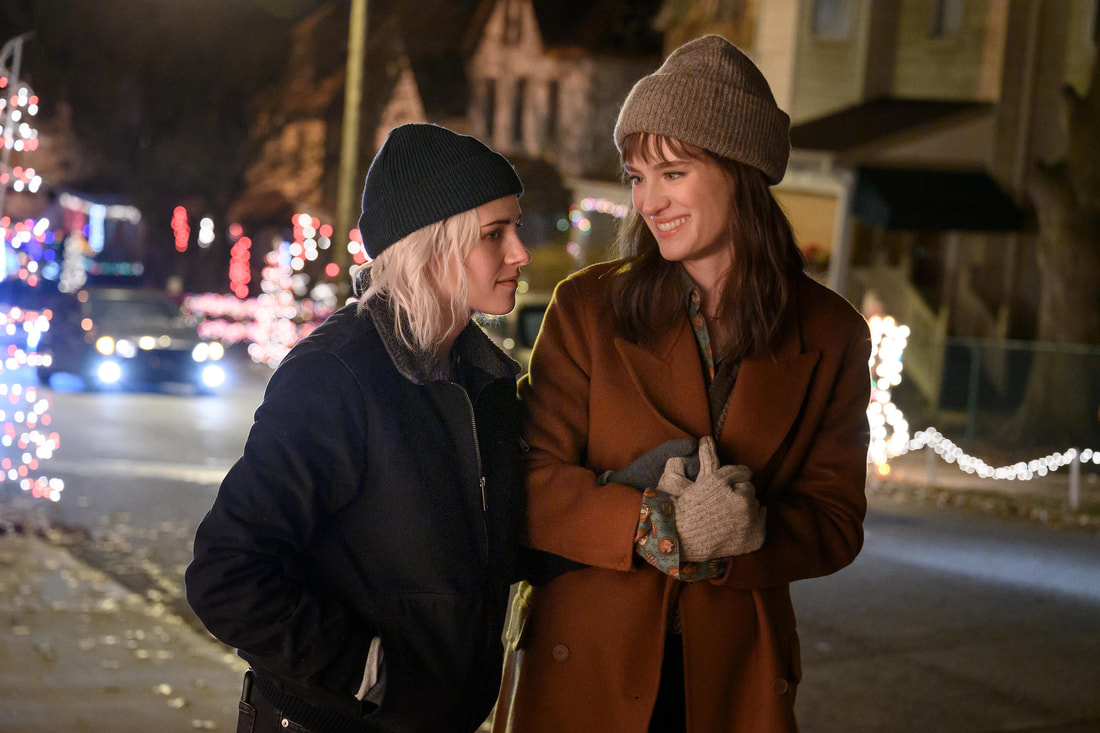|
By Nadia Dalimonte Kristen Stewart and Mackenzie Davis in Happiest Season (2020) ’Tis the season for Happiest Season! Clea DuVall’s queer holiday rom-com is a warm and bright story about two women falling in love around Christmastime. The story explores specific representation and a universal theme of being home for the holidays while trying to navigate family expectations and yearn for acceptance. This is a film that really feels like Christmas, in the sense that DuVall explores many different elements of visiting family during a time of year that stresses the importance of togetherness. As bouncy and funny as the film is, there are also incredibly moving moments that radiate from a place of authenticity and speak to how people have their own personal coming out stories unique to them. Happiest Season welcomes an all-star cast of characters who are each revolving around one woman’s journey of coming out.
The film follows the relationship between Harper (Mackenzie Davis) and her girlfriend Abby (Kristen Stewart) at a point when they are falling more and more in love with each other. Harper adores Christmastime; the lights, the ambience, all that jolly jazz. Abby is reluctant to celebrate; when she was 19, her parents died around the holidays, so each passing year she avoids getting involved in Christmasy activities. One twinkly night in a spur of the moment, Harper invites Abby to spend the holidays at her parents’ house. Abby gets over some hesitation and not only agrees but makes plans to propose on Christmas morning. She wants to declare her love for Harper to everyone, but her excitement is upended when she finds out Harper hasn't come out to her parents yet. What follows is an awkward maneuvering around family members to maintain secrecy as Abby agrees to Harper’s proposal that the two hide their identities just for a few days. So, Abby is introduced as an ‘orphan friend’. This dilemma takes on a life of its own in the film. We see Abby play along for the sake of supporting the woman she loves, Harper, who is not yet ready to express her true self. The pressures of validation and expectation are especially heightened within Harper’s family. Her oblivious father Ted Caldwell (Victor Garber) is aspiring to become mayor, and her picture-ready mother Tipper Caldwell (Mary Steenburgen) documents their ‘perfect’ family life on social media to garner acceptance for political success. From Harper’s perspective, she fears coming out would turn the family dynamics upside down and interfere with what is expected of her. DuVall perfectly captures the weight of feeling pressured to make your loved ones proud and feeling worried that you’ll lose their love if you let them down. It’s an ongoing theme that the other characters exhibit as well (in different ways), namely Harper’s sisters Jane (Mary Holland) and Sloane (Alison Brie). Jane, who’s great with routers and printers, brings an infectious bouncy energy to the family. Holland, who co-wrote the film with DuVall, plays Jane with such joyful brilliance. Her character has a deep level of self-acceptance, and it is this peace of self that makes her the family outcast as people hesitate to accept her. Meanwhile Sloane, along with her husband Eric (Burl Moseley), quit a fancy job to start a gift basket business. They have two kids and are altogether the picturesque family unit, but underneath her uptight demeanor she has a secret of her own. All of these family dynamics play out as Abby tries to find her footing and stay true to herself in spite of the Caldwell game of charades. Her best friend and confidant John (Dan Levy), gives her moral support from the sidelines. Levy, hot off the heels of Schitt’s Creek success, brings his familiar wit and impeccable timing to the film. His character’s expert tracking skills eventually lead him to the Caldwell home in the final act, during which he and Stewart share a stunning scene. He personalizes a moving monologue about how everyone’s coming out story is different, and in that moment, the emotional core of the film pours out. As the narrative of Happiest Season surrounds Harper’s journey, characters from her past pop out of the woodwork and give some backstory to the hurdle she’s trying to jump over. Her ex girlfriend Riley (Aubrey Plaza), who has the best introduction in the film, strikes up a bond with Abby and through their interactions, we learn more about how Harper’s coming-out story affects those around her. One of the most intelligent and engaging aspects of the film is how the writing validates Harper’s coming-out experience, even though on the surface her character makes some unfortunate decisions. DuVall also makes the good call of focusing on how the family dynamics affect Abby, because this experience does alter her perspective and naturally brings into question her feelings towards Harper. As a result, we see another avenue where the story could go with the inclusion of Plaza’s character. The more distant Abby feels from Harper, the more she feels drawn to Riley and we eventually learn why Riley can identify with Abby’s situation. The relationship dynamics are well written and brought to life with the performances. Davis is great, Plaza is a scene stealer, and Stewart truly anchors the film. Happiest Season is genuinely funny and stands out in countless ways, most of all with a smart screenplay. The writing is heartfelt in portraying the complexities of self-acceptance and generous in bringing pure joy to the screen. The performances share a love and care for creating an enjoyable, sweet rom-com that will become a holiday classic.
0 Comments
Leave a Reply. |
Archives
June 2024
Categories |


 RSS Feed
RSS Feed